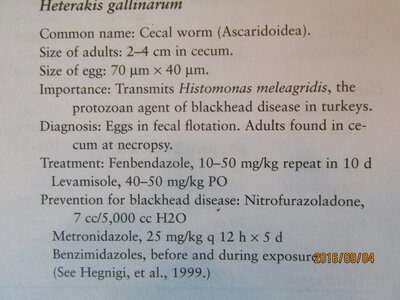I’ve started learning to do my own fecal floats. I’ve got a couple of questions and I’m hoping someone may have advice or help or additional links and info... (ie @casportpony 

 ) or even help IDing (ie @Sue Gremlin)
) or even help IDing (ie @Sue Gremlin)  @KsKingBee thoughts?
@KsKingBee thoughts?
I have five or six symptomatic birds. Potential reduction in egg laying, potential lethargic behavior (but it is summer for both of those), and messy bottoms. I’ve reduced protein and bathed them and they’re still messy. My flock free ranges.
I’ve done five floats so far. One was clean. two had a small load of eggs (80-100/gram), and two had high counts (1800 & 1950/gram).
the eggs are either round worm or cecal worms, and I’m having a hard time differentiating. I ordered a lens with a scale to measure. the eggs are measuring 85x50 um. Which seems closer to Ascarid egg size? But to me they do look fairly parrallel and maybe closer to heteraksis. I also included one photo with a rounder egg, the only egg this shape on all the slides but also made me think it could be roundworms
in addition while doing The fecals I found worms. Not large like typical roundworm photos in manure that I’ve seen. Small, like the description of tapeworm segments. I believe I isolated a segment and got it on a slide. Here are my photos. Is this a tapeworm segment?
worm(??) is at 40x mag. It’s about 2/3 cm long and it measures 2 or 3 mm on the scope at various points. (I don’t know my math right away for what that measurement is at 40x magnification.)
Egg is 100x magnification.






 @KsKingBee thoughts?
@KsKingBee thoughts?I have five or six symptomatic birds. Potential reduction in egg laying, potential lethargic behavior (but it is summer for both of those), and messy bottoms. I’ve reduced protein and bathed them and they’re still messy. My flock free ranges.
I’ve done five floats so far. One was clean. two had a small load of eggs (80-100/gram), and two had high counts (1800 & 1950/gram).
the eggs are either round worm or cecal worms, and I’m having a hard time differentiating. I ordered a lens with a scale to measure. the eggs are measuring 85x50 um. Which seems closer to Ascarid egg size? But to me they do look fairly parrallel and maybe closer to heteraksis. I also included one photo with a rounder egg, the only egg this shape on all the slides but also made me think it could be roundworms
in addition while doing The fecals I found worms. Not large like typical roundworm photos in manure that I’ve seen. Small, like the description of tapeworm segments. I believe I isolated a segment and got it on a slide. Here are my photos. Is this a tapeworm segment?
worm(??) is at 40x mag. It’s about 2/3 cm long and it measures 2 or 3 mm on the scope at various points. (I don’t know my math right away for what that measurement is at 40x magnification.)
Egg is 100x magnification.





